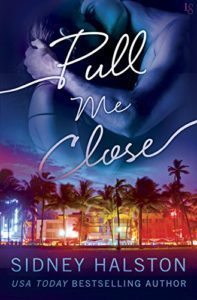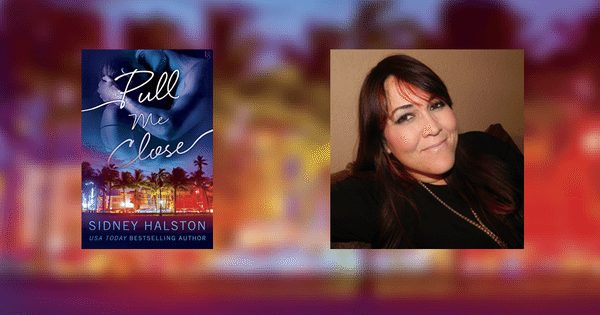“Pull Me Close is a heart-gripping story about one of the most beautiful things in the world: the power of love.”
—New York Times bestselling author Aurora Rose Reynolds
 USA Today bestselling author of the Worth the Fight series, Sidney Halston, decided to take a more autobiographical approach to her latest novel, Pull Me Close, when she chose to include a heroine with anxiety. Pull Me Close follows the story of Katherine who is struggling with anxiety. She makes an attempt to attend her sister’s engagement party but experiences difficulties, passing out in the middle of the club right into the arms of the club owner. Nico thinks she’s just another girl OD’ing on his dance floor and wants nothing to do with her except to get her out of his club. But as he learns the reason behind her passing out, he can’t help but get involved. Halston too has dealt with anxiety for most of her life and wanted to include it in one of her novels, find out why below.
USA Today bestselling author of the Worth the Fight series, Sidney Halston, decided to take a more autobiographical approach to her latest novel, Pull Me Close, when she chose to include a heroine with anxiety. Pull Me Close follows the story of Katherine who is struggling with anxiety. She makes an attempt to attend her sister’s engagement party but experiences difficulties, passing out in the middle of the club right into the arms of the club owner. Nico thinks she’s just another girl OD’ing on his dance floor and wants nothing to do with her except to get her out of his club. But as he learns the reason behind her passing out, he can’t help but get involved. Halston too has dealt with anxiety for most of her life and wanted to include it in one of her novels, find out why below.
When I was about twelve years old, I began getting horrible pain in the area around my diaphragm. My parents took me to so many specialists and they all told me nothing was wrong. This went on for years. It was an on-and-off again pain that would hurt when I breathed. But, nope—there wasn’t anything wrong with me, according to everyone.
As the years went by, the pain would come and go. When I was about sixteen, I began to get a constant fear that something would happen to my parents.
You should know that I have a classic type A personality.
I want to do everything, and I want to do it perfectly,
and I want to do it all right this second.
Well, at sixteen trying to be perfect combined with the stress of being a teenager is a recipe for disaster. By seventeen I was working part-time and I remember one day, just snapping and not being able to go to work. I didn’t want to leave my house, I was convinced my parents would die at any moment and I would be left alone to raise my younger brother. As I write this I’m trying to put the way I felt into words but it’s very difficult because as irrational as my thoughts were, it was very real to me.
My parents didn’t understand. For the most part, we didn’t have any major problems. My parents were (and still are) happily married, we lived in a normal middle-class community, I had great grades and was, for the most part, healthy.
What was I so worried about?
But in my mind, all I kept thinking was—it’s too good to be true.
I just kept waiting for the other shoe to drop.
ALL. THE. TIME.
Just waiting for something horrible to happen. I would feel like throwing up all the time, and I thought I would faint at any given moment. None of that ever happened, but I thought it would.
One day my mother took me to a psychologist. I didn’t want to go because I wasn’t “crazy”, I just had the pain in my abdomen and anxiety. I wasn’t depressed, I wasn’t crying. I was just nervous. I knew my thoughts were irrational, and because I knew this, it made me think—I just need to control my irrational thoughts. As if it were that easy. I was diagnosed with severe anxiety and that pain—well that pain was part of the anxiety. Because mental illness affects the body in so many physical ways. I was having panic attacks all the time. I was put on medication, and I remember feeling weird about that. Like— wow, I’m crazy. Literally. Diagnosis confirmed.
As I graduated high school and then went to college
and eventually law school, things got progressively worse.
The thing with these kinds of medicines is that there’s a lot of trial and error. You have to try different brands and different doses and sometimes they make you feel worse. So, I’d stop them for a while and then start them up again. The funny thing is—no one besides my immediate family knew this was going on. When a panic attack hit, I made an excuse and ran out of the room. I didn’t tell people I was having an anxiety attack—Oh, I just remembered I left my garage door open. Gotta run.
I remember going out with my then boyfriend (now husband) and having to leave mid-date because I thought I was dying. DYING. This happened dozens and dozens of times. I would call my parents and my brother to make sure they were okay and then I would continue freaking out until eventually, I’d go to sleep. Because panic attacks are exhausting!
I can honestly say, my anxiety lasted until about five years ago (almost 20 years). Around the time I had my twins I also lost my job. This was the most stressful moment of my entire life. Yet, my panic attacks sort of faded away. I’m not saying I’m cured. No way. Not even close. I always have an “in case of emergency” bottle of Xanax in my purse and every once in a while I’ll feel the panic attack start to creep up. But, for some reason, when I had my twins something changed. Maybe it was hormonal? Or maybe it was that around that time I found my passion for writing stories.
Writing has been in many sense of the word—my salvation.
It gave me an outlet
for my need to keep busy all the time.
It’s also something that you need to focus on.
It’s hard to have a panic attack when you are so enthralled in what you are doing. Whatever the case may be, I’m better. I think finding a hobby is critical. That’s the advice I’d give anyone who’s feeling out of control.
When I started writing Pull Me Close I wasn’t sure if people would like it. My fear was that people would find Katherine weak. Why can’t she just walk out of her house? But I didn’t give my readers enough credit. Not one person (and there are currently 89 early reviews) said that Katherine is weak. In fact, I’ve never, not in ten previous books, received so many personal messages or great reviews. Apparently, we all have some of Katherine in us. Whether you suffer from anxiety like I do, or PTSD like Katherine, or depression like so many people do—it’s a ‘real’ thing. It doesn’t make you weak. As Katherine says:
Your illness doesn’t define you.
You define you.
If you were diabetic, or had high blood pressure, you’d get that treated, right? Well, mental health is an illness just like any other illness and you shouldn’t be ashamed of it. It shouldn’t go unchecked and you can’t let it get out of control. Trust me, being stuck at home letting your life pass you by, isn’t the answer. So, for everyone that identified with Katherine and asked me about my research—I was my research. It’s me. I can relate to her. I know how she felt, so it wasn’t too hard to write.
This is a very personal story I’m sharing with you because mental illness is a lonely disease. You’re stuck in your head.
But I hope that by sharing my story with you,
you can feel at least a little hopeful or feel empathy
towards those who are struggling.
And, in turn, I hope you will share your personal stories with me—with the world. Let’s all be fearless together.
You are not alone.


Great post Sidney!! So wonderful of you to share your experience with your readers! #fearlessfriday